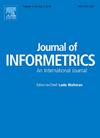Quantifying delayed recognition of scientists
IF 3.5
2区 管理学
Q2 COMPUTER SCIENCE, INTERDISCIPLINARY APPLICATIONS
引用次数: 0
Abstract
Delayed recognition is a significant phenomenon with implications for career advancement, funding opportunities, and the dissemination of scientific knowledge. Despite its importance, most studies have focused on delayed recognition at the paper level, leaving a gap in understanding how this phenomenon unfolds at the level of individual scientists. This paper presents a novel framework for quantifying delayed recognition in scientists by analyzing their career-level citation trajectories. The framework utilizes two key metrics—the author beauty coefficient () and author career awakening time ()—to capture the temporal dynamics of a scientist’s citation impact over the course of their career. Our analysis demonstrates that these metrics reveal patterns distinct from paper-level measures, with no significant correlation to averaged paper delayed recognition scores. Fixed-effect regression analyses indicate that female scientists and those pursuing novel or disruptive research experience greater delays in recognition. Additionally, through Coarsened Exact Matching (CEM) analysis, we find that scientists in smaller groups exhibit higher survival rates in academia but also face more significant delayed recognition. This paper delivers a fresh methodological approach and critical insights into the demographic and research factors driving delayed recognition, enhancing our understanding of scientific impact at the individual level.
量化科学家的延迟识别
延迟认识是一种重要的现象,对职业发展、资助机会和科学知识的传播都有影响。尽管它很重要,但大多数研究都集中在论文层面的延迟识别上,在理解这一现象如何在科学家个人层面展开方面留下了空白。本文通过分析科学家职业水平的被引轨迹,提出了一个量化科学家延迟认知的新框架。该框架利用两个关键指标——作者美丽系数(AB)和作者职业觉醒时间(Atα)——来捕捉科学家在其职业生涯中被引用影响的时间动态。我们的分析表明,这些指标揭示的模式不同于纸张水平的测量,与平均纸张延迟识别分数没有显著的相关性。固定效应回归分析表明,女性科学家和从事新颖或颠覆性研究的科学家在认知上有更大的延迟。此外,通过粗化精确匹配(CEM)分析,我们发现较小群体的科学家在学术界表现出更高的存活率,但也面临更严重的延迟识别。本文提供了一种新的方法方法和对驱动延迟识别的人口统计学和研究因素的关键见解,增强了我们对个人层面的科学影响的理解。
本文章由计算机程序翻译,如有差异,请以英文原文为准。
求助全文
约1分钟内获得全文
求助全文
来源期刊

Journal of Informetrics
Social Sciences-Library and Information Sciences
CiteScore
6.40
自引率
16.20%
发文量
95
期刊介绍:
Journal of Informetrics (JOI) publishes rigorous high-quality research on quantitative aspects of information science. The main focus of the journal is on topics in bibliometrics, scientometrics, webometrics, patentometrics, altmetrics and research evaluation. Contributions studying informetric problems using methods from other quantitative fields, such as mathematics, statistics, computer science, economics and econometrics, and network science, are especially encouraged. JOI publishes both theoretical and empirical work. In general, case studies, for instance a bibliometric analysis focusing on a specific research field or a specific country, are not considered suitable for publication in JOI, unless they contain innovative methodological elements.
 求助内容:
求助内容: 应助结果提醒方式:
应助结果提醒方式:


